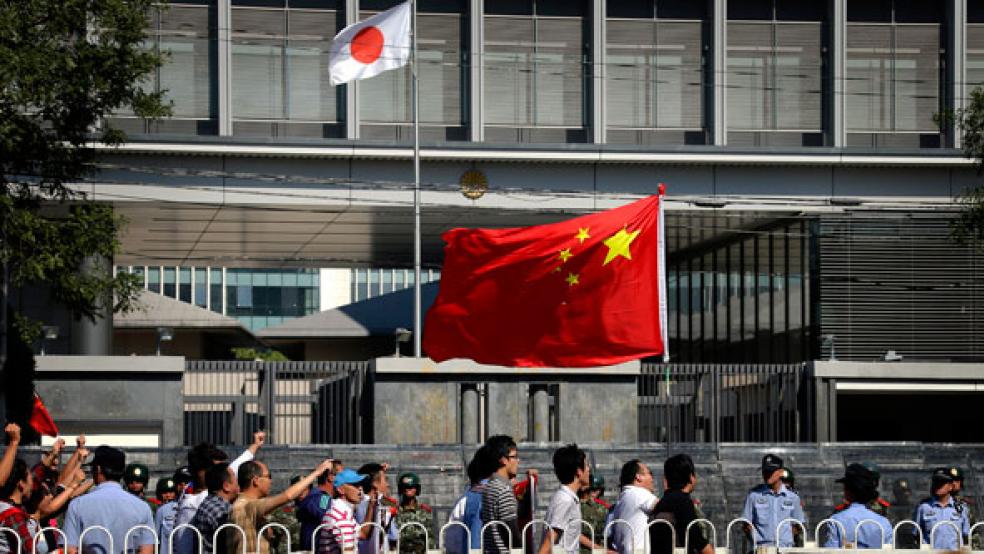China’s move to establish an air defense zone over a series of disputed islands in the East China Sea is being viewed by experts as a bold power play by Beijing and a reminder that China is quickly emerging as a military force in Southeast Asia.
The Chinese have formally claimed the airspace above the Senkaku Islands, a territory that has long been a source of dispute between China and Japan, although Tokyo has served as the island’s administrator for years. Now, under international law, any plane that wishes to fly over the islands must notify Chinese authorities or China has the right to shoot it down.
RELATED: IS CHINA TRADING A FLY ZONE FOR A GROWING ECONOMY?
American military planes have already violated the space, a message of defiance to Beijing. But according to Yun Sun, a fellow with the East Asia program at the Stimson Center, China’s unexpected aggressiveness in seizing the air space has given the Chinese the upper hand in the dispute.
“It was assertive, a little but unnecessarily so, with China sticking its nose in everyone’s face,” she said. “For China to unilaterally to declare at a sensitive time and as tension has been escalating has been perceived to be unnecessarily bold.”
Vice President Joe Biden expressed concern over China's actions with Chinese President Xi Jinping yesterday. However, Xi refused to back down, saying that China had a right to claim the airspace. China now also claims the legal right to fire on any plane that enters this airspace unannounced. If that happens, Sun said she fears that it could lead to a broader conflict.
“Everyone has been worried about the chance of miscalculation and the chance of a small skirmish escalating into a major confrontation,” she said. “People don’t necessarily think China or Japan intends to start a war. But in such a crowded area, there are so many planes, so many vessels. A small mistake could lead to a major military confrontation.”
“We hope that people in Beijing and Tokyo are not aiming for a war,” she said.
Historic Roots
On the surface, the conflict is about airspace. But dig deeper and there are years of grievances and counter-grievances between China and Japan that make the situation combustible.
For instance, according to Nan Li, a member of the China Maritime Studies Institute at the U.S. Naval War College, China and Japan have long sparred over who would control maritime rights in the East China Sea.
“The sea is not wide enough for each country to have the nautical jurisdiction they would like. The sea is just 320 miles. Japan argues China and Japan should divide the water in the middle. China believes in the continual extension principle [which allows China to claim jurisdiction over water 200 miles out from its continental shelf]. These Chinese claims extend pretty close to Okinawa,” he said.
RELATED: OBAMA’S TALKS WITH CHINA JUST GOT MORE AWKWARD
Nan added that China was upset that surveillance flights have been using the airspace to spy on Beijing’s burgeoning military.
“China has been concerned about U.S. and Japanese surveillance flights that sometimes fly pretty close to China’s shore to check out China’s military capabilities,” he said. “Once you establish a zone you could at least put some pressure on surveillance flights.”
Game of Brinkmanship
Sun said that China’s airspace claim was a shrewd one; now that they’ve formally made it, it’s recognized by international law.
“China’s behavior can be summarized as we want to do this and we’re going to do this,” she said. "It’s a bluffing game. China is calling U.S. and Japan’s bluff by declaring the zone and seeing what [Japan and the United States are] going to do about it. If they want to take military measures, they will be the ones responsible. They can lodge a diplomatic complaint. The U.S. and Japan don’t have a lot of options."
For now, she said she does not expect the United States to send additional troops to the region as a show of force. However, if China continues to needle Washington and Tokyo, that could change.
“If China becomes even more assertive pushing the tension to the next level, the Untied States is very likely to expand their military deployments in the region,” Sun said.
This article was updated on December 5.
Top Reads from The Fiscal Times:





